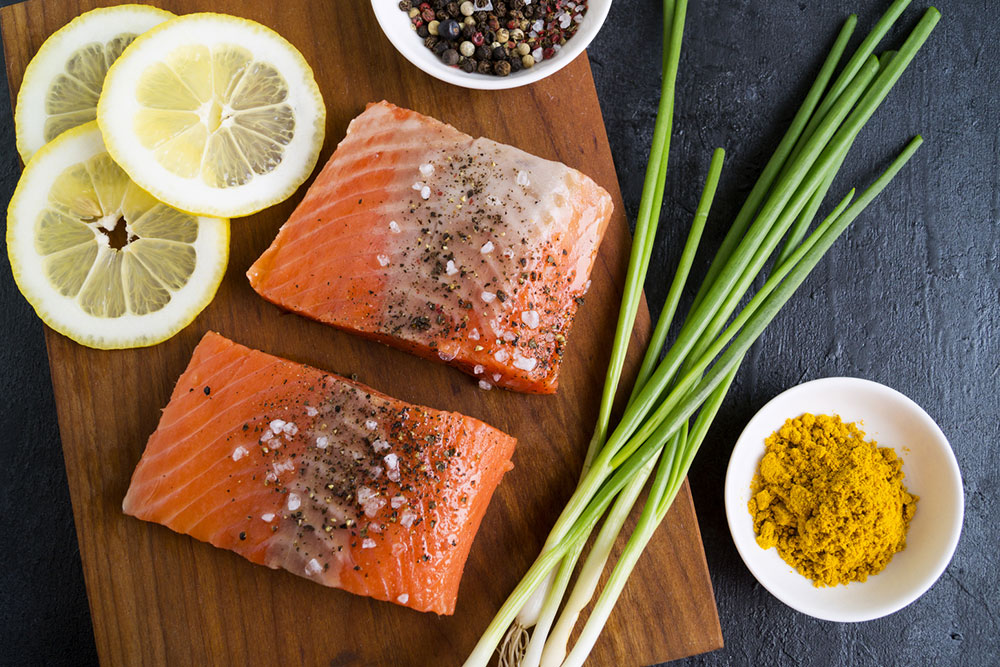
Top 6 foods for keeping anemia at bay
Anemia is a common condition characterized by a deficiency of red blood cells or a diminished ability of these cells to carry oxygen. The condition can cause fatigue, weakness, and other health issues. To prevent such a deficiency and maintain optimal health and vitality, it is crucial to follow a balanced meal plan rich in essential nutrients. So, here are a few foods that can help keep anemia at bay:
Salmon
Salmon, a fatty fish, is not only rich in omega-3 fatty acids but is also a valuable source of heme iron. Further, omega-3s offer anti-inflammatory properties that can help address underlying conditions contributing to anemia, making salmon a well-rounded choice for preventing this condition. In addition to heme iron, salmon contains vitamin B12, a nutrient vital for red blood cell formation. It also offers vitamin D, which helps in absorbing calcium and maintaining bone health, and selenium, an antioxidant that protects red blood cells from oxidative damage.
Beef
Beef is a potent source of heme iron—a highly absorbable form of iron found in animal products. Heme iron is particularly helpful in preventing a type of anemia called iron-deficiency anemia. Beef also provides an array of essential nutrients beyond iron. It contains high-quality protein, zinc, and B vitamins, such as B12 and B6, which are essential for producing healthy red blood cells. Additionally, beef offers selenium, a mineral with antioxidant properties that helps protect red blood cells from damage. When adding beef to meals, it is essential to choose lean cuts to minimize saturated fat intake. Pairing beef with a variety of vegetables can further enhance its nutritional profile and support overall health.
Almonds
Almonds are nutrient-dense nuts containing significant amounts of iron, vitamin B6, and zinc. These nutrients are required for the production of red blood cells and play a pivotal role in preventing anemia. Iron in almonds is non-heme iron, the type found in plant sources. While non-heme iron is not as easily absorbed by the body as heme iron, pairing almonds with vitamin C-rich foods, like oranges or strawberries, can enhance mineral absorption. Further, almonds are rich in monounsaturated fats, fiber, and antioxidants, which contribute to overall cardiovascular health and help fight inflammation, a common underlying factor in anemia.
Lentils
Lentils are great plant-based options for preventing anemia. They are rich in non-heme iron, so pairing them with vitamin C-rich foods like bell peppers can enhance iron absorption. Additionally, lentils are rich in protein, thereby providing the body with essential amino acids. Protein is crucial for various bodily functions, including the production of enzymes and hormones. Lentils also provide significant amounts of folate, a B vitamin that supports the formation of healthy red blood cells. Further, the fiber in lentils aids in digestion and helps regulate blood sugar levels, contributing to overall health and well-being.
Spinach
Spinach, a leafy green, is an excellent source of both iron and folate. Iron is crucial for the production of hemoglobin—a protein responsible for carrying oxygen in red blood cells. Folate, on the other hand, supports the creation of healthy red blood cells and helps prevent anemia. Spinach is also rich in other key vitamins and minerals, including vitamins C and K, potassium, and magnesium. Vitamin C, when combined with non-heme iron-rich foods like spinach, enhances iron absorption.
Fortified cereals
Fortified cereals are a great way to increase the overall intake of essential nutrients like iron and vitamin B12, which are both crucial for preventing anemia. Some breakfast cereals are fortified with iron, making it easier to meet daily iron needs, especially for those who lead a plant-based lifestyle. On the other hand, B12 is primarily found in animal products, so vegetarians and vegans may find it difficult to get enough of this vital nutrient. However, some fortified cereals contain vitamin B12, making them a suitable choice for those looking to prevent anemia without opting for animal products.
By choosing nutrient-rich foods, one can keep anemia at bay and improve overall health and well-being. However, one should always consult with a healthcare professional or registered nutritionist for personalized recommendations before making any drastic changes to their meal plan. A customized nutritional regimen should meet specific nutritional needs and health goals.